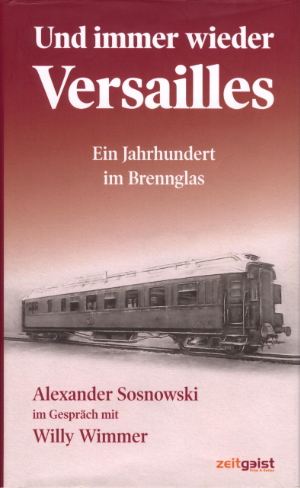“And always Versailles”
A century in focus. Alexander Sosnowski in conversation with Willy Wimmer
by Wolfgang van Biezen
“If ever we were to re-educate the German population it would be a good thing to mix freely with them and teach them our standards of freedom and individual responsibility.”
Field Marshal Montgomery, September 19451
A Russian and a German expert met last year and discussed the global weather situation before and after “Versailles”. Both authors of the book “Und immer wieder Versailles”, published in May 2019, are, it may rightly be stated, committed to peace in the world.
Measured by how the so-called Versailles Peace Treaty after 1919 set the peoples of Europe against each other, thereby preparing new military conflicts, how Central Europe was dismembered, how three empires were abolished overnight, how the Ottoman Empire was filleted, how revolutions shook the western part of Eurasia, for the first time in the history of mankind a nation mutated into the only world power, so measured by the force of the upheavals, it is astonishing that, with regard to Versailles, only few noteworthy impulses for a public and broad discussion about the causes and effects of these treaties could be heard from historians’ circles on the occasion of the anniversary.
Has there been peace in the world since the so-called peace treaties of 1919? Has there been a change in thinking and acting with regard to war and peace? Has it become the rule that in case of disagreement, the negotiating table is sought out to avoid a possible military conflict with all its misery?
Are wars really banned? Is international law more than just a declaration of intent? Who gives one nation the right to order re-education to another nation? Is it allowed to draw borders arbitrarily?
Why is the nature of man, which is oriented towards peace and a fulfilling living together with fellow human beings, so disgraceful disregarded?
Why may we not live in peace with our neighbours? What does the deployment of the self-styled offensive alliance Nato on the border with the Russian Federation have to do with collective security? Why is China, along with Russia in London on 4 December 2019 at the NATO summit, classified as a “challenge” for Nato?
There are actually nations that take the right to claim war as a political tool. What philosophy allows such thinking? Who decides in which direction historical research is allowed to go and in which in no case? Are there presidents – elected by the people – who are simply pushed away because they are not appropriate?
Yes, and who dominates the global financial system? Who are the beneficiaries and who are the victims? Who wants peace, who wants war?
Professor Alexander Sosnowski, born in Kiev in 1955, is a proven expert in security policy. He works for several German and Russian media. He talks to Willy Wimmer, who is already known to our readers as a politician in the German Bundestag, author and writer of several fundamental articles about German past and present history.
Both authors have extremely interesting biographies, and the conversation between both, their further thoughts and the extensive answers take the reader at the highest level with political and historical considerations of the today’s burning questions. This book is easy to read, but requires some knowledge. It should be read with prudence and leisure. Then it turns out to be an appropriate stimulus for thinking ahead concerning the “Versailles” event. Both men have a similar understanding of history: Versailles has a prehistory. At the Vienna Congress, after the devastating Napoleonic Wars, all parties, including the defeated, sat at the table and struggled for a European peace order. The Russian tsar Alexander I developed the plan to resolve future conflicts peacefully at the negotiating table before an armed conflict ensued. The Austrian Chancellor Metternich agreed to this very sensible approach. The British, already on their way to becoming a world power, were unable to gain anything from this approach and declared firmly that it was essential for them to wage war whenever and wherever it seemed necessary to them.
A course was set that has determined Anglo-Saxon politics up to the present. How this looks like, what kind of thinking is used, how two world wars were started and how everything plays into the present is developed in an excellent and extremely educational manner in this conversation between Sosnowski and Wimmer. With amazing knowledge. As the saying goes, the two authors work together on the same wavelength. This is rather unusual and enjoyable for Russian-German and German-Russian history. A modern picture of history is enriched by new, previously unknown or not conceived connections. •
1 Instructions for British Servicemen in Germany 1944. First published by the Foreign Office, 1943. Preface. Translation and reprint Kiepenheuer and Witsch, Cologne 2015
